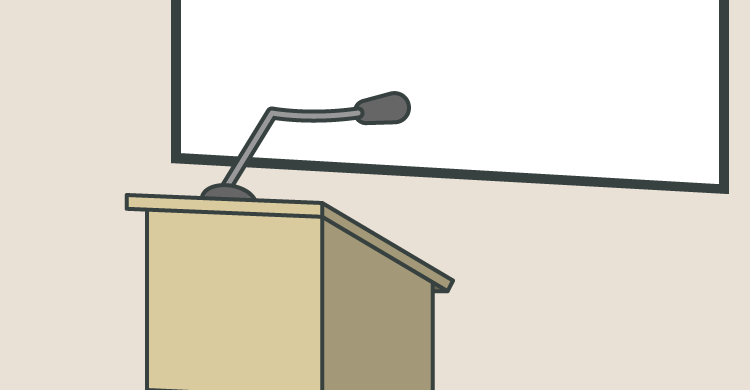I have led professional development for school faculties and at educational conferences in the United States and now in Singapore. It’s a slightly heady feeling—walking into a ballroom with a nametag on, the highlights from my CV preceding my entrance. Some of the presentations over the years have been one-offs, and for me, these are the most thrilling. It’s as close to being a rock star—a rock star in a button-down collar, khakis, and sensible shoes, that is—as I’ll ever feel.
Two- and three-day institutes can be more challenging, perhaps a little more “real” than the one-offs. I can see the attendees sizing me up; they’re stuck with me for more than a little while. Thought bubbles float above their heads as clearly as if Charles Schulz drew them: “Is this guy going to be boring?” “He’s kinda hard to understand because of his scratchy voice” “Is he all shtick or does he have substance, too?” And above mine: “I think that approximately 56 percent of the audience is on their personal devices at this moment. This is not a good sign.” “Is that the dude I used to teach with back in 1998?” “My underwear is way too tight. Gotta get to the gym.” And we settle in. We hunker down. We make it through the two or three days just fine, and we are all better for it. We’ll exchange emails as we conclude, give each other handshakes and hugs, even take a photo or two. It means something to me. Thank-you cards or even gifts will sometimes emerge, and I keep them and appreciate them.
The longer institutes—the longest I’ve done are two weeks—are marathons. Marathons. I morph into something other than myself during these stretches of time; I transform. I’ll live in a hotel room. After dinner, I’ll prepare my materials until 10 or 11 p.m. In the mornings, I’ll wake up early and get out my old meditation books I’ve brought along in the hope that I’ll have enough time to become meditative in the mornings again. I’ll start eating more healthily. By the end, I’ve really come to know all of the teachers well enough to even love a few of them. I cherish the cards and gifts, and I keep them near my teacher desk at school. I’ll look at them from time to time; they remain important to me to this day.
The most difficult of all of the kinds of presentations I’ve given, however—and this has been true for me for the last 15 years, from the time I, at 29 years old, first stepped in front of my peers to give a presentation about how to teach grammar and mechanics during creative writing lessons and one of the oldest, most veteran participants took my handout, graded it in red pen, and smugly handed it back to me at the end of the presentation—is the one given to my own colleagues, the teachers I work alongside each day. There is nothing I have done as a professional developer that is as nerve-wracking, cottonmouth-inducing, and/or terrifying. Making a PD presentation to my colleagues in my own school during our own planning time when we could be doing a zillion other things sometimes feels like being asked to balance a shiny apple on my head while everyone else gets to play William Tell. I become hypersensitive during the presentation, too. I consider every one of them who is grading a paper or who has a laptop open (and mentally note them, I must admit. They must have been poor students, I arrogantly think to myself).
I think the challenge when presenting to one’s own faculty is not unlike the challenge or stress we feel, perhaps, when we sit around the table at a holiday family gathering: everybody knows everybody else’s business, and pass the mashed potatoes, please. There are no charades here, no airs to be put on. The emperor most definitely has no clothes, and Elvis has most definitely left the building. When I am in front of my own colleagues, it is clear to me that I will be sharing the copier with them in a couple of hours, will be pushing past them near the teacher mailboxes after the talk, will be asking them for help with a particular problem later in the day. They’ve seen me at my best and at my worst, not unlike my family at the aforementioned holiday table.
I’m reminded of a scene from one of my favorite films, Edward Scissorhands. In it, neighborhood Avon Lady Peg Boggs (played by Dianne Wiest) calls on her neighbor Helen (Conchata Ferrell), who answers the door in a nightgown and curlers. Peg, dressed for the part and wearing a pillbox hat, stands at the door and gives the neighbor her best Avon spiel, complete with practiced hand gestures:
Peg: Avon calling.
Helen: Weren’t you just here?
Peg: No, not since last season. Today I’ve come to show you our exquisite new line in softer colors in shadows, blushes, and lipstick. Everything you need to accent and highlight your changing looks.
Helen: My changing looks? That’s good! (Helen chuckles.)
Peg: [undeterred] Well, it goes without saying that I also have a complete selection of your old favorites. Those tried-and-true products we’ve all come to depend on, year in and year out.
Helen: Come on, Peg. I never buy anything from you. You know that?
Peg: I know. Bye, Helen.
Though comedic, the seed of truth in the Peg Boggs example is relevant for me when I’m presenting at my school. So why then is it important for me to continue to throw myself upon the torture rack of presenting to my own colleagues? Why knock on Helen’s door? Why is it necessary to practice this most challenging kind of PD delivery instead of, say, only making presentations at conferences or giving talks to faculties far afield where I can try to be that nerdy rock star?
The short answer is this: I must make regular PD presentations to my own colleagues because it makes me a better professional developer in a way that nothing else can. It is fundamental to my growth; it makes me work very, very hard to create presentations that have style, substance, and meaning; I want the information and approaches to work because these are the teachers and colleagues I care about the most. What I present must matter; every second with my colleagues is one which I know—deeply understand—could be used for a different purpose. And if I haven’t brought my “A” game, well, I will be the one to pay the immediate price for my laziness or inaccuracy: I will lose my colleagues’ respect.
For me, those are the highest stakes of all as a professional developer.
And so, after I’ve worked for weeks or even months on a presentation for my own faculty, have had the requisite sleepless night(s), and have given it my best shot, a respected colleague says, “Hey, thanks for that. I got a lot out of it. I appreciate how heartfelt you were and the risks you took in front of us,” it means everything to me.
It means I’m ready for the world.
Reference:
Thompson, C. Edward Scissorhands. Film script. 1990. IMSDb. Web. 8 August, 2015.
[author_bio id=”188″]






